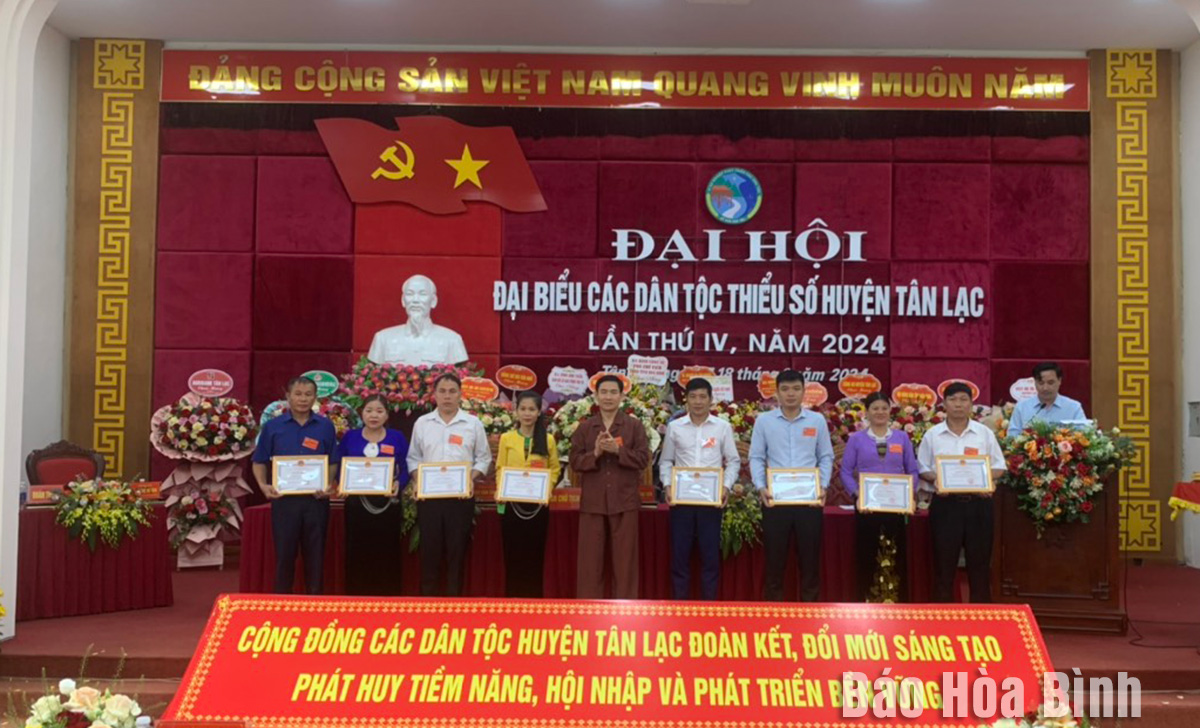
Tan Lac district on June 18 held its 4th Congress of Ethnic Minorities, drawing the participation of 150 delegates from the district's ethnic minority areas.

Leader of the Tan Lac
district People's Committee awards certificates of merit to collectives with
outstanding achievements in the emulation movement for socio-economic
development in ethnic minority and mountainous areas.
Over recent years, ethnic minorities in the district in
general and ethnic minorities in extremely difficult areas in the district in
particular have benefited a lot from national target programmes, contributing
to creating a facelift in rural areas and favourable conditions for
socio-economic development, and improving locals’ knowledge. In the 2019 – 2024
period, local ethnic minorities have made efforts to boost economic
development, and agricultural and forestry in a sustainable and comprehensive
direction. The district has achieved important socio-economic development results,
with the poverty rate decreasing from 19.66% in 2019 to 9.40% in late 2023.
In the coming time, Tan Lac strives to have the average
income of ethnic minorities reaching at least half of the national average,
reduce the poverty rate to below 7%, and basically have no longer particularly
difficult communes. In addition, 40% of ethnic minority labourers will know how
to work in the fields of industry, handicrafts, tourism, and services; and 90%
of communes and villages in ethnic minority and mountainous areas have enough
infrastructure to meet socio-economic development requirements.
The congress elected 10 delegates to attend the higher-level congress.
On this occasion, the Chairperson of the district People's Committee awarded
certificates of merit to eight collectives and 15 individuals with outstanding
achievements in the emulation movement for socio-economic development in ethnic
minority and mountainous areas.
In the spirit of "Party members go first, the people follow”, all households of Party members in the Doan Ket sub-region in Da Bac town, Da Bac district, voluntarily removed gates and fences, and donated land when the road expansion project passed through their properties. Inspired by their example, 68 households in the sub-region quickly followed suit, contributing over 1,400 sq.m of residential and perennial cropland to widen the main road through the residential area. The exemplary role of Party members in Doan Ket stands as a shining example of studying and following President Ho Chi Minh’s thought, morality, and lifestyle.
The Hoa Binh provincial People's Committee held a monthly meeting on May 29 to assess the implementation of socio-economic development tasks in the first six months of 2025, the progress of key projects, and some other important issues.
During his lifetime, President Ho Chi Minh always expressed his deep affection and special concern for children and youth. He once emphasized: "Caring for and educating children well is the responsibility of the entire Party and the entire people”; "First of all, the family (i.e. grandparents, parents, siblings) must do this job well”. "the Party Committees…, the Children’s Committee, the Youth Union, the education sector, and all related organizations must have specific plans to ensure children grow healthier and more progressive”. His teachings has been remaining valuable and serving as the guiding principles in the work of protecting, caring for, and educating children. In line with this ideology, Hoa Binh Province has continuously been prioritizing and investing resources in the well-being of children in recent years.
Mr. Nguyen Phi Long, the alternate Member of the Party Central Committee and Secretary of the Provincial Party Committee chaired the meeting of the Standing Committee of the Provincial Party Committee to provide opinions on several investment projects within the province. There was the attendance of Ms. Bui Thi Minh, the Permanent Deputy Secretary of the Provincial Party Committee and Chairwoman of the Provincial People’s Council; Mr. Bui Đuc Hinh, the Deputy Secretary of the Provincial Party Committee and Chairman of the Provincial People’s Committee and other members of the Standing Committee; the leaders from other departments, agencies, and some localities.
The Standing Board of the Vietnam Fatherland Front (VFF) Committee of Hoa Binh province held a meeting on May 28 to honour outstanding village elders, village heads, and reputable individuals from local ethnic minority and religious communities.
In mid-May, the provincial Museum organised an exhibition named "Duoi la co Dang Cong san Viet Nam quang vinh” (Under the flag of the glorious Communist Party of Vietnam). This meaningful activity took place in the joyful atmosphere to celebrate the country's major holidays and the Party congresses at all levels for the 2025-2030 term, towards the 14th National Party Congress.



